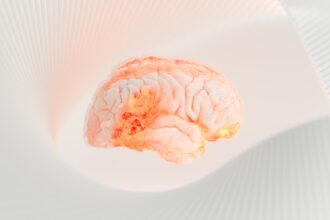Dopamine is a neurotransmitter that plays a crucial role in the brain’s reward system, influencing various aspects of behavior and cognition. As you delve into the world of neuroscience, you will discover that dopamine is often referred to as the “feel-good” chemical, primarily because of its association with pleasure and satisfaction. This chemical messenger is not just about feeling good; it is intricately linked to motivation, learning, and even emotional regulation.
Understanding dopamine’s multifaceted role can provide you with insights into your own behaviors and the underlying mechanisms that drive them. As you explore the complexities of dopamine, you will find that it is produced in several areas of the brain, including the substantia nigra and the ventral tegmental area. These regions are pivotal in regulating movement, emotion, cognition, and reward.
The release of dopamine can be triggered by various stimuli, from achieving a goal to consuming food or engaging in social interactions. This neurotransmitter’s influence extends beyond mere pleasure; it shapes your experiences and decisions, making it a vital component of your daily life.
Key Takeaways
- Dopamine is a neurotransmitter that plays a key role in reward, motivation, learning, memory, addiction, impulse control, goal-directed behavior, procrastination, habit formation, mood, emotion, self-control, and willpower.
- Dopamine is closely linked to the brain’s reward system and is involved in the anticipation and experience of pleasure, as well as the motivation to seek out rewards.
- Dopamine plays a crucial role in learning and memory by strengthening neural connections and facilitating the encoding of new information.
- The relationship between dopamine and addiction is complex, with dopamine reinforcing the rewarding effects of addictive substances and behaviors, leading to compulsive and harmful patterns of use.
- Dopamine’s impact on impulse control is significant, as it influences the ability to resist immediate gratification and make decisions that align with long-term goals.
Dopamine’s Role in Reward and Motivation
Dopamine is fundamentally linked to the concepts of reward and motivation. When you engage in activities that bring you joy or satisfaction, your brain releases dopamine, reinforcing those behaviors and encouraging you to repeat them. This process is essential for survival, as it drives you to seek out experiences that are beneficial for your well-being.
For instance, when you accomplish a task or receive praise, the surge of dopamine reinforces your motivation to pursue similar achievements in the future. Moreover, dopamine acts as a signal for your brain to prioritize certain behaviors over others. When you anticipate a reward, your dopamine levels rise, creating a sense of excitement and eagerness.
This anticipation can be a powerful motivator, pushing you to take action toward your goals. However, it’s important to recognize that this system can also lead to unhealthy patterns if not managed properly. For example, the pursuit of instant gratification can sometimes overshadow long-term goals, leading to a cycle of behavior that may not always serve your best interests.
Dopamine’s Influence on Learning and Memory

The role of dopamine extends into the realms of learning and memory, where it facilitates the encoding and retrieval of information. When you learn something new or experience something rewarding, dopamine is released, enhancing your ability to remember that information. This connection between dopamine and memory is particularly evident in educational settings, where positive reinforcement can significantly impact your learning outcomes.
As you engage with new material or skills, dopamine helps solidify those experiences in your memory. This process is not just about retaining facts; it also involves associating emotions with those memories. For instance, if you receive positive feedback after a presentation, the dopamine released during that moment can help you remember not only the content of your presentation but also the feelings associated with it.
This emotional connection can motivate you to seek out similar experiences in the future, further reinforcing your learning journey.
The Relationship Between Dopamine and Addiction
| Study | Findings |
|---|---|
| Research 1 | Dopamine release in the brain is associated with the rewarding effects of addictive substances. |
| Research 2 | High levels of dopamine receptors in the brain are linked to increased susceptibility to addiction. |
| Research 3 | Chronic drug use can lead to decreased dopamine production, contributing to addiction and withdrawal symptoms. |
Dopamine’s powerful influence on reward pathways makes it a key player in the development of addiction. When substances such as drugs or alcohol are consumed, they can lead to an overwhelming release of dopamine, creating intense feelings of pleasure. This surge can condition your brain to associate these substances with positive experiences, leading to repeated use despite negative consequences.
Understanding this relationship is crucial for recognizing how addiction can take hold and why it can be so challenging to overcome. As you consider the implications of dopamine in addiction, it’s essential to acknowledge that not all individuals respond to substances in the same way. Genetic predispositions, environmental factors, and personal experiences all contribute to how dopamine affects your behavior.
For some, the pursuit of pleasure through substances may become a primary focus, overshadowing other aspects of life. Recognizing this pattern can be the first step toward seeking help and making healthier choices.
Dopamine’s Impact on Impulse Control
Dopamine also plays a significant role in impulse control, influencing your ability to resist immediate temptations in favor of long-term goals. When dopamine levels are high, you may find it more challenging to exercise self-control, as the allure of instant gratification becomes more pronounced. This dynamic can lead to impulsive decisions that may not align with your long-term aspirations.
To improve impulse control, it’s essential to understand how dopamine functions within your brain’s reward system. By recognizing situations where you may be more susceptible to impulsive behavior—such as stress or fatigue—you can develop strategies to manage those urges effectively. Techniques such as mindfulness and delayed gratification can help you cultivate greater self-discipline and make choices that align with your values and goals.
Dopamine’s Involvement in Goal-Directed Behavior

Dopamine is intricately linked to goal-directed behavior, serving as a motivator that propels you toward achieving your objectives. When you set a goal and work toward it, dopamine is released as you make progress along the way. This release reinforces your efforts and encourages you to continue striving for success.
The anticipation of achieving a goal can also trigger dopamine release, creating a sense of excitement that fuels your motivation. As you pursue your goals, it’s important to break them down into manageable steps. Each small achievement can lead to a release of dopamine, providing positive reinforcement that keeps you engaged in the process.
By celebrating these milestones, you create a feedback loop that enhances your motivation and commitment to reaching your ultimate objectives.
The Connection Between Dopamine and Procrastination
Procrastination is often linked to fluctuations in dopamine levels, as low levels can lead to decreased motivation and increased avoidance behavior. When faced with tasks that seem overwhelming or unappealing, your brain may struggle to release enough dopamine to propel you into action. This can create a cycle where procrastination becomes a default response to challenging tasks.
To combat procrastination effectively, it’s essential to understand how dopamine influences your behavior. By breaking tasks into smaller, more manageable parts and rewarding yourself for completing each step, you can stimulate dopamine release and create a sense of accomplishment. This approach not only helps you overcome procrastination but also fosters a more positive relationship with productivity.
Dopamine’s Role in Habit Formation
Habit formation is another area where dopamine plays a critical role. When you engage in a behavior repeatedly and experience positive outcomes, dopamine reinforces that behavior, making it more likely that you’ll continue doing it in the future. This process is fundamental for developing both healthy habits—such as regular exercise—and unhealthy ones—like smoking or excessive screen time.
To harness the power of dopamine in habit formation, consider implementing strategies that promote consistency and reward yourself for progress. By creating an environment that supports positive behaviors and celebrating small victories along the way, you can effectively shape your habits over time. Understanding how dopamine influences this process empowers you to take control of your actions and cultivate habits that align with your goals.
Dopamine’s Influence on Mood and Emotion
Dopamine significantly impacts mood and emotional regulation, influencing how you experience joy, sadness, and everything in between. Low levels of dopamine have been associated with feelings of apathy or depression, while higher levels can enhance feelings of happiness and motivation. This connection underscores the importance of maintaining balanced dopamine levels for overall emotional well-being.
To support healthy dopamine levels and improve your mood, consider engaging in activities that naturally boost its production. Regular exercise, social interactions, and pursuing hobbies that bring you joy can all contribute to increased dopamine release. By prioritizing these activities in your daily life, you can foster a more positive emotional state and enhance your overall quality of life.
Dopamine’s Contribution to Self-Control and Willpower
Self-control and willpower are closely tied to dopamine’s influence on decision-making processes. When faced with choices that require restraint—such as resisting unhealthy foods or avoiding distractions—your brain’s reward system plays a pivotal role in determining your actions. High levels of dopamine can enhance self-control by reinforcing positive choices while low levels may lead to impulsive decisions.
To strengthen your self-control and willpower, it’s essential to cultivate awareness of how dopamine affects your choices. Developing strategies such as setting clear intentions or practicing mindfulness can help you navigate challenging situations more effectively. By understanding the interplay between dopamine and self-control, you empower yourself to make decisions that align with your long-term goals.
Practical Applications of Understanding Dopamine in Behavior Change
Understanding dopamine’s role in behavior change offers valuable insights for personal development and growth. By recognizing how this neurotransmitter influences motivation, learning, impulse control, and emotional regulation, you can implement practical strategies for positive change in your life. Whether you’re seeking to break free from unhealthy habits or cultivate new ones, leveraging the power of dopamine can enhance your journey toward self-improvement.
Consider applying these insights by setting specific goals related to behavior change and incorporating rewards for achieving milestones along the way. By creating an environment that supports positive behaviors—such as surrounding yourself with supportive individuals or engaging in activities that bring joy—you can stimulate dopamine release and reinforce your commitment to change. Ultimately, understanding dopamine empowers you to take charge of your actions and create lasting transformations in your life.
It is often referred to as the “feel-good” chemical because of its involvement in the brain’s reward system, which reinforces behaviors by providing pleasurable sensations. An interesting article that delves into the intricacies of dopamine’s impact on behavior can be found on Unplugged Psych. This article explores how dopamine levels can affect decision-making and the pursuit of goals, providing insights into the neurological underpinnings of behavior modification. For more detailed information, you can read the full article here.
LEARN WHY Your Brain Isn’t Addicted to Likes; the Algorithm Gaslights You Daily, Hard.
FAQs
What is dopamine and its role in behavior change?
Dopamine is a neurotransmitter that plays a key role in motivation, reward, and reinforcement. It is involved in the brain’s reward system and is linked to feelings of pleasure and satisfaction. Dopamine also plays a role in learning, decision-making, and movement.
How does dopamine affect behavior change?
Dopamine is involved in the process of reinforcement, which is essential for behavior change. When a behavior is followed by a rewarding experience, dopamine is released in the brain, reinforcing the connection between the behavior and the reward. This can lead to the repetition of the behavior in the future.
What are the implications of dopamine in behavior change?
Understanding the role of dopamine in behavior change can have implications for various fields, including psychology, neuroscience, and addiction treatment. It can help in developing strategies to promote positive behavior change and in understanding the mechanisms underlying addictive behaviors.
How can dopamine be manipulated to facilitate behavior change?
There are various ways to manipulate dopamine levels to facilitate behavior change. This can include using rewards and incentives to reinforce desired behaviors, engaging in activities that naturally increase dopamine levels (such as exercise), and in some cases, using medications that affect dopamine function. However, it is important to use these strategies responsibly and under the guidance of a healthcare professional.




